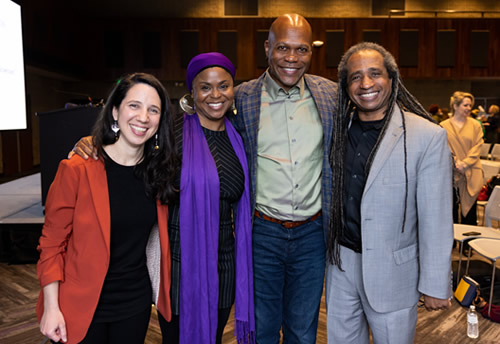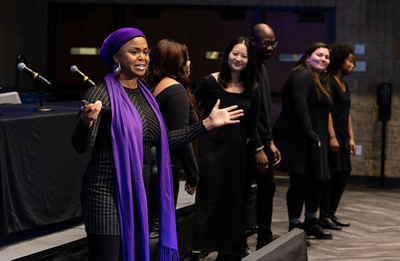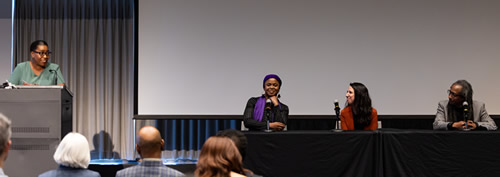New Faculty Speaker Series to Forge Connections Within SoC
Whether using performance as protest, acknowledging bias in research, or documenting in film historical inequalities, three School of Communication faculty crossed departmental lines to contemplate the necessity of equity and inclusion in their scholarly and artistic work during a special symposium April 6 at the Norris University Center.
The event was the first CommConnections, a new symposium series established to cross disciplines and create partnerships in the School of Communication.

Cristal Chanelle Truscott (associate professor in performance studies), Adriana Weisleder (assistant professor in communication sciences and disorders), and Marco Williams (professor in radio/television/film) each presented on how equity and inclusion play a uniquely profound role in the meaning, intentionality, and efficacy of their work. Robin Means Coleman, Northwestern’s vice president and associate provost for diversity and inclusion, chief diversity officer, and the Ida B. Wells and Ferdinand Barnett Professor in the Department of Communication Studies, served as discussant and moderator.
“Discoveries are made in interdisciplinary spaces, so we are working to build more bridges within the SoC to strengthen our community and reimagine our mission as a laboratory for artistry, expression, and experimentation,” said SoC Dean E. Patrick Johnson as he introduced the event. He explained that each of SoC’s departments enjoys a stellar reputation, but seldom did faculty members cross departmental lines to collaborate or create anew. Johnson created CommConnections to facilitate new partnerships and innovations in the communication arts and sciences.
Truscott kicked off the 90-minute event with an acapella performance of “We Shall Overcome” performed by some graduate students and then discussed notes from a 1963 nonviolent civil rights protest, where protestors were given this guidance: “Everyone sings, no exception. If you can’t sing, sing louder.”
“The collective and communal act of singing was the protest,” Truscott said. “Singing was the aspiration and the assembly. Its potential to be ongoing, evolving and never final provided all at once the action, the information, and the understanding of protest as physical, visual, emotional, communal, simply instruction: everyone sings. No exceptions. But also, no requirements for participation. Just radical inclusion. Inclusion was the requirement or expectation.”
In her work, Truscott uses song and performance to reimagine what it might mean to create a safe space of radical inclusion. The playwright, director, and scholar founded Progress Theatre, a touring ensemble company promoting anti-racism engagement and facilitation of cross-community conversations and connections.
“I’ve researched and rehearsed practices for entering and engaging with communities with active listening, learning, imitation, collaboration, and exchange,” she said. “Practically, this means during our residencies while on tour, we spend more time in the communities than on stage. The community is our main stage, and rehearsing with the communities is a creative practice. Our residencies center around long-range community-based collaboratives and exchange spaces to partner with local social justice and anti-racism change makers.”

The ensemble is currently developing Plantation Remix, a “site-responsive, neospiritual performed at history plantations and other sites related to U.S. systems of slavery to raise the separatist genre of slavery tourism by exploring and rehearsing a contemporary future-building, after-life for these sites.”
“This piece is not a living history performance piece,” she said. “It’s a living future performance piece.”
Weisleder, director of the Child Language Lab, studies the early language development in young children, notably those in bilingual households. She talked about the importance of including different perspective in the science. She pointed out that most of the research of child language acquisition focused on English speakers, and was conducted by English-speaking scientists studied and wrote that research. The current body of research, she said, includes less than 2% of the world’s languages.
“It’s not too much of a leap to say, we clearly need to extend representation of research from other countries and languages to address this problem,” she said. “But I’ll show that’s not really sufficient. Even if we brought in those researchers, we’d still be shaped by this history.”
English, she pointed out, is a language where the word unit reigns supreme, so the key focus in English development in children is focused on vocabulary size.
“Our perspectives are limited. We want to question the perspective of the listener, not just the speaker,” she added. “How are bilingual children described in schools? As English language learners, or English as a second language, or limited English proficient… What does that imply about who is doing the listening? The listener is limited in their proficiency in other languages. Could we describe children, not by what they are lacking, but by what the bring?”
Williams, in his presentation, discussed and showed a clip from his documentary, Tell Them We are Rising: The Story of Historically Black Colleges and Universities (2017). The film explores the significance of HBCUs and documents nonviolent protest of students across historically Black colleges in the 1960s and 1970s. He showed a clip of a student protest in 1972 at Southern University in Louisiana, where hundreds of police were sent in under false pretenses and then shot and killed two students.

“As you have seen in this short excerpt, that the demand for equity by Black college students in the 1960s and 1970s, came with a cost and a toll, and if we bring ourselves to today, there’s so much work we need to do to achieve diversity, inclusion, equity,” Williams said. “Or as I like to say, to DIET—diversity, inclusion, equity, and transformation. I think what’s critical in my view, in reflecting on the work that I’ve been doing, is that this DIET benefits us all…and to those who might feel vulnerable or might perceive a threat to their standing and status, they need to know that equity transforms. It transforms institutions, the individual, it transforms us all for the better.”
When Williams was through, Robin Means Coleman began her questions of the panelists, but not before reminding all in attendance how important dialogues like these are.
“Do know that pedagogy, the very act of teaching, is activism,” she said. “Education is the most powerful change. Altering the human condition, that is changing people’s hearts and minds, sometimes in just sixteen short quarters, is a heavy lift.”
